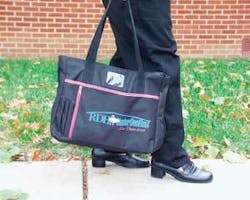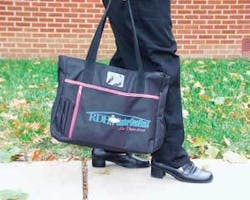Those Darn Canvas Bags
I recently sat in my bedroom staring at my closet. It was filled with various projects that I planned to do that had not come to fruition. One such project was perched like rocks on the edge of a cliff. Next to my well-worn roper boots and a shocking yellow scarf (that I could not part with since my son, now 25, gave it to me when he was 5) sat 28 rainbow-colored canvas bags. Each bag was from a trip: bright red, a trip to RDH Under One Roof; black, an ADHA convention; orange, the World AIDS Conference. Each one held a memory, but the darn things had taken over my closet.
So I took them out and went to “the drawer” in the bathroom. “The drawer” contained various items from trips from New York to Denver. There were shampoos, soaps, creams, toothbrushes, and sewing kits. I filled each bag, then went to the kitchen to add a breakfast bar, vitamin pack, a cup of noodles, and a gift certificate from McDonald’s.
When I went from room to room, I found a bag of new socks, pens and pencils, a deck of cards, a small radio, and dozens of other small, unused gifts. I took the filled bags to a local shelter, and the folks there acted like I was delivering bags of gold. One man’s darn canvas bag is another man’s treasure.
I now ask for everyone’s cast-offs at conventions, and look forward to the opportunities each one presents. The canvas bags are an alternative to the black trash bags foster children are often given to hold their personal items. Each canvas bag is filled with a blanket crocheted by my friend Dee, made with yarn that my friend Gayla finds at yard sales. What started with a few of my unwanted canvas bags has turned into friends from far and near donating their canvas bags or starting their own projects.
Wednesday night visits
I love Wednesday nights. After work I go to the Simi Valley Free Clinic to volunteer. There, I spend a few hours helping make people’s lives a little brighter, their health a little better, and ease some of the pain the world has brought them. The satisfaction I get from volunteering is indescribable.
Recently I treated a patient whose mouth had been in pain for months. He wore the adversity of the world in his clothing, carefully patched and spotted with the earth of hardship, and he carried all his possessions in a backpack. I was able to help ease his pain. After we went over preventive measures and I gave him the necessary equipment, he said, “I have no money. Is there any way I can repay you?” I responded, “Yes. Do one small thing for another.”
Weeks went by, and one evening when I returned to the clinic he was waiting in the lobby to see the dentist. He approached me and said, “I did everything you said.” I said, “Great! How’s the Proxabrush® working out?” He said, “Just fine, but that’s not what I’m talking about. I did one small thing.” He explained that he had taken my suggestion into the world and shared the kindness he had been shown. He had assisted a young lady on crutches, and shared his meager lunch with a man in the park who was asking for help. He had also stopped on the side of the road to aid an elderly woman whose car was not working. Each was a simple act of kindness.
In the words of Margaret Mead, “Never doubt that a small group of thoughtful, committed citizens can change the world; indeed it’s the only thing that ever has.” Everyday acts of kindness can change the world, but for some people, volunteering seems overwhelming. “How will I have the time?” “Where will I do it?” “Someone else can do better than me.”
While sitting at lunch in a beautiful bistro in downtown Chicago with three good friends - Anne Guignon, Ellen Neuenfeldt, Kris Smith - volunteering came up. My friends asked, “How do you do it?” I replied, “I don’t. I am just the spark; my friends and family are the flame.” I have the opportunity and privilege to make a difference with simple acts of kindness, and I ask those around me to perform just one act. I am only one, but when I ask others to join me we are more, and the possibilities are infinite.
How do you get started?
It is not necessary to step outside your comfort zone to make a difference. Having something to give and finding a person with a need is simple. There is a vast array of opportunities: foster care, the free clinic, transitional housing, shelters, hospice, and suicide prevention. Local newspapers and social services agencies often have lists of organizations that need help. Choose a project that is convenient for you and that you believe in. The passion you have for a cause will reflect in your efforts.
Assess the need
You must assess the need before you fill it. Years ago as I walked my children to preschool, a man stood on the corner with a sign asking for money for food. He was there every morning clutching two brown paper bags. In the afternoon as we returned home, we would see him passed out on a park bench, intoxicated. My daughter asked me if we could help him. I told her we could help him, but that we needed to figure out what he really needed.
We went home and thought of the things the man really needed. Money? A smile? Food? We filled a box with the things my children decided he really needed, and each day we passed him we gave him an item. An orange, a box of peanut butter crackers, a pair of socks, some hand wipes, and a comb.
Simple things that could make a difference were what he really needed. Before I start any project I think, what do the people involved really need?
The first time I donated to an organization, I simply took 20 toothbrushes that had been filling my drawers and wrapped each in a washcloth with a bar of soap, a tube of toothpaste, and a floss container. I tied them together with curling ribbon and dropped them off at a teen shelter a mile from my home. I knew the shelter had a need because one of my patients who worked there had told me they had no funds for personal care items. Starting simple can lead anywhere. Give your old eyeglasses to the Lions Club, drop off those extra clothes to a charitable organization, give your used books to the library, spend an hour reading to a senior citizen at a rest home, drop cookies off at your local fire station.
If you do not feel like you can do it alone, join someone else’s project. Ask to do one thing. I delegate much of the work I do. This is how we accomplish so much. I ask my friends and family to take on small jobs like giving an hour at the clinic or gathering one item for a foster care bag. These simple things combined can amount to a great project.
What is your passion ... what is your one thing? Do you shop well? You could shop for a shut-in. Are your closets filled to the brim with possibilities for a family that has nothing? Do you have an extra hour to take a cancer patient to a chemotherapy appointment? There are many fantastic programs such as national “Make a Difference Day”* that provide the tools to get started. Sometimes it is just a matter of giving an hour. Other times it is a matter of cleaning out your closet and seeing the possibilities in those darn canvas bags. RDH
* Make A Difference Day is the most encompassing national day of helping others - a celebration of neighbors helping neighbors. Created by USA WEEKEND Magazine, Make A Difference Day is an annual event that takes place on the fourth Saturday of every October. You can join a project or create your own. The Web site www.makeadifferenceday.com has everything to get you started.

